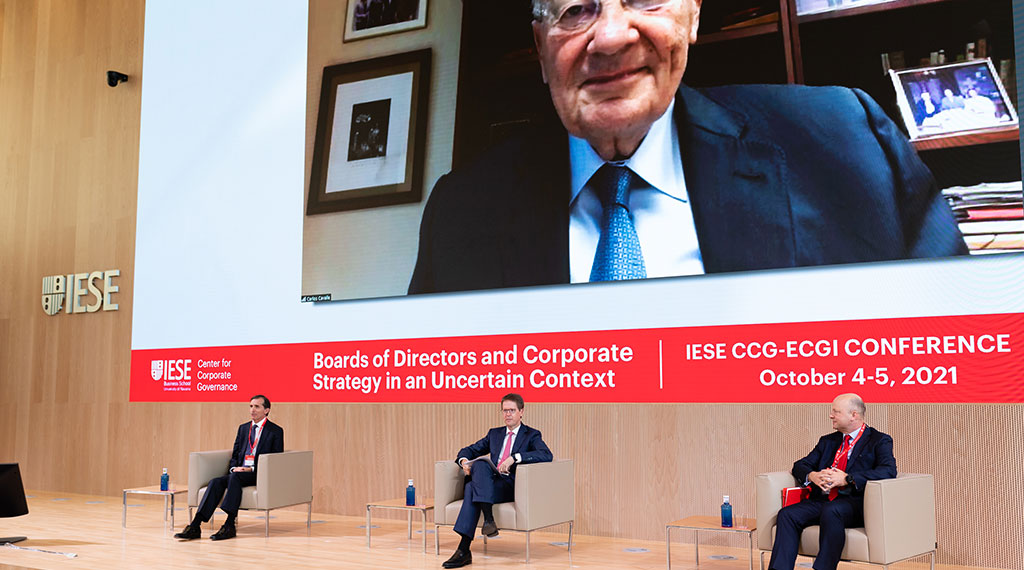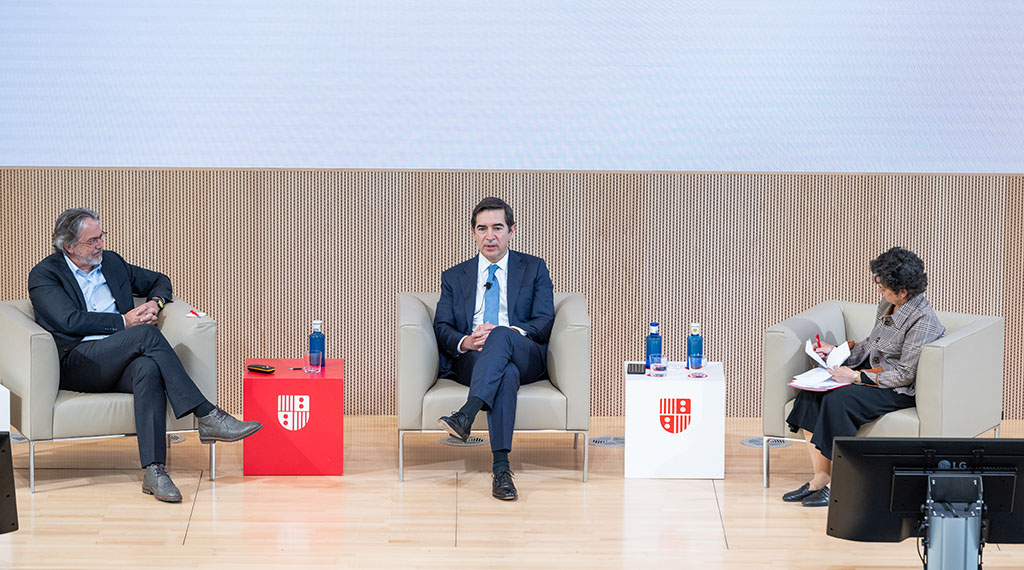Stories
Trust between boards of directors and management key in uncertain times
IESE’s Corporate Governance Conference looks at COVID-19 impact and sustainability in corporate strategy
IESE’s Jordi Canals and Franz Heukamp; Marco Becht of the ECGI; and Carlos Cavallé (on screen) at the opening of the Corporate Governance Conference.
Photo: Javier Arias
October 6, 2021

A strong trust-based relationship between boards of directors and management is key to corporate strategy at any time, but it’s even more so in times of uncertainty like the present.
That was one of the main themes of a two-day Corporate Governance Conference organized this week by IESE’s Center for Corporate Governance and the European Corporate Governance Institute (ECGI). The conference, sponsored by the Social Trends Institute, brought academic experts in corporate governance, CEOs and other top executives together on IESE’s new Madrid campus. Speakers included Nobel Prize winner Bengt Holmström, Oxford University’s Colin Mayer, Jay Barney of the University of Utah and Ioannis Ioannou of London Business School.
Time and again, speakers stressed that a strong relationship between boards of directors and management teams is key to corporate performance and strategies. Boards have the duty to govern the firm and help develop it sustainably for the long term. That means making decisions on corporate strategy, even in contexts of increasing uncertainty.
Frequent interaction, basis for good governance
“Interaction is key to the relationship between the board and the management team, in order to be sure that we don’t miss something. In an uncertain context it is important that they interact frequently, not only once a year,” said Tobías Martínez, CEO of Cellnex.
Jay Barney, professor at the University of Utah, recommended that CEOs follow three strategies to improve their relationship with the board: “Stay close to stakeholders so that you’re aware of their problems; focus on one group at a time in order to centralize efforts and minimize response times; and don’t forget about shareholders.”
Risto Siilasmaa, former Chairman of Nokia, agreed that the relationship between the board and the management team must be based on trust: “We need to rebrand Corporate Governance. Rethink it, and make it more attractive.”
Margarethe Wiersema, professor at the University of California, explained how activism affects boards: “Boards must be more proactive and ask the hard questions on strategy. Communication with institutional investors and keeping them abreast of what’s going on at the firm is also key.”
Digitalization must be part of agenda
Bengt Holmström, MIT professsor and Nobel laureate in Economics, spoke about digitalization in boards. “The tsunami is coming, boards need to pay attention, as this will change strategy dramatically,” he said. “Boards must become more involved in strategy, we need a massive shift in mindset,” he said noting that in the case of Apple, for example, the board played an important role in helping Steve Jobs see the value of digitalization.
Sustainability enters boardroom
Sophie L´Helias, head of LeaderXXChange, commented that boards need to make sure that when we talk about purpose “it is really integrated into the strategy. Strategy is operational and it needs to integrate governance, environment and social factors, as well as financial factors.”
“The board of directors has to ensure that a sustainable strategy is set and to ensure that this strategy is set in the long term,” Denise Kingsmill, board member of Inditex, said.
For his part, Jean-Pascal Tricoire, president of Schneider Electric, stressed that it’s important to have your own sustainability agenda. “Sustainability changes the purpose of your company,” he said.
“Sustainability is really complex. No one can do everything but everyone needs to do something. Partnership is the way to do it,”, Juvencio Maeztu, Deputy CEO & CFO of Ingka Ikea, added.
Speed to manage uncertainty
For Francisco Reynés, Chairman of Naturgy, “The pandemic helped us to move quicker. We have realized that a very important crisis may happen. The company may survive with much more simple procedures. We are more efficient in our way of working, more trust in technological aspects.”
Reynés supports the return to face-to-face meetings. “I hate Zoom because it reduces a lot of human contact. We have lost the human touch which is very important. For easy decisions this is less important, but Zoom cannot substitute a very important face-to-face discussion, when different points of view are required.”
Renée Adams, professor of the University of Oxford, agreed: “In virtual meetings people show off more, but the impact on the results is less significant. They ask fewer questions.”


